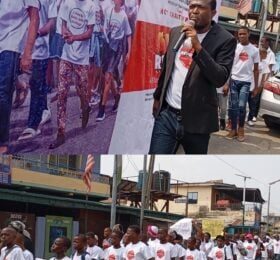
Bola, University Student:
Bola was a brilliant 19-year-old Engineering student at the University whose grades were in the first-class range. His roommates recently observed that he was talking to himself and behaving in an odd manner. They tried to engage him but when he became aggressive, they reported to the University Health Services who came for him with an ambulance. He was later referred to the Teaching Hospital where he was diagnosed with Schizophrenia. His parents were invited and counselled by the doctors, but they were adamant that their son was not having a medical problem. A spiritual leader had warned them a few weeks back to be prayerful and watch out for enemies. Now it is noticeably clear to them that his illness is spiritual warfare and the work of ‘enemies’. The parents insisted that he should be discharged and took him back to the village. That was the last that his classmates heard of him, as he never returned to school.

Fast forward 20 years later, and we discover that Bola is now a shadow of himself as a poor village farmer and looks much older than his actual age of 39 years. He had spent a couple of years in chains at a traditional healer’s home but never fully returned to normal functioning. Thus, he joined his parents on the farm so they could keep an eye on him. They also arranged a wedding between him and a young girl from another family who was also stigmatized on account of epilepsy. Both families agreed they would be a good match as they both had disabilities. They now have three children who were not attending school.
Dr Tunde:
Tunde was a charismatic medical doctor who ran a successful private hospital in town. He worked long hours and comfortably provided oversight and supervision for the clinical, administrative, and financial aspects of his establishment. However, his wife and two children were involved in a tragic accident while returning home from school, and they died. Dr. Tunde became a shadow of himself and became very irritable and miserable. Everyone understood his grief and were sympathetic. He became very short-tempered and would frequently snap at everyone – including patients who have come to his hospital. He stopped paying attention to details and often appeared distracted and lost in his thoughts. His friends attempted to step in, by asking him to take a break and go on a vacation but he dismissed such suggestions. When they became more worried, they suggested a psychiatric evaluation which only infuriated him more. ‘What do they mean’? He retorted. So, they left him alone. Gradually, his best hands resigned and left, and the hospital deteriorated and became dilapidated. His income drastically fell and he decided to close the place down. He took solace inalcohol andlocked himself in the house and drank all day. Eventually, his friends and family decided that they could not just stand idly by and watch him destroy himself. They broke into the house, with the help of policemen, and brought him to the hospital for involuntary hospitalization. He was diagnosed as suffering from severe depression with suicidal tendencies.
Commentary
The onset of mental health problems is often during adolescence and young adulthood. Indeed, about 50% of adult mental health problems would have started by the age of 15 years. Unfortunately, this is the most crucial period for young people to acquire skills and an education that will empower them for a productive adulthood and the ability to earn an income. Thus, most of these young persons would either be in school or in the phase where they are learning a trade, when these mental health challenges knock them off track, as we see with Bola.
With adequate treatment and psychosocial support, Bola should have returned to the University to complete his education. Chances are high that if he had graduated with a first class in Engineering, he would have secured a good job and his economic status would have improved. The same also applies to the young girl he married in the village, who had no schooling and was married off because she had Epilepsy. Theseevents may lead to a generational cycle of poverty – as their 3 children in the village are not enrolled in school.
It is therefore clear that ‘mental’ health is wealth, as demonstrated by the examples of Bola and Dr. Tunde. We need to dispel the ocean of ignorance, shame, and stigma around mental health problems. The negative and downward spiral can be avoided if affected persons receive prompt attention and treatment. They can and should be leading productive and healthy lives. Empathy, support,and professional intervention are crucial to a positive outcome.We can all play our part. Will you?
The Asido Foundation aims to promote open conversations around mental illness, and we invite you to support the#unashamed campaign by visiting www.asidofoundation.com/unashamed and taking a pledge to support affected persons. The campaign is aiming for 1 million signatures. So take the pledge and invite others to also do the same. Together, we can change the narrative.
READ ALSO FROM NIGERIAN TRIBUNE








